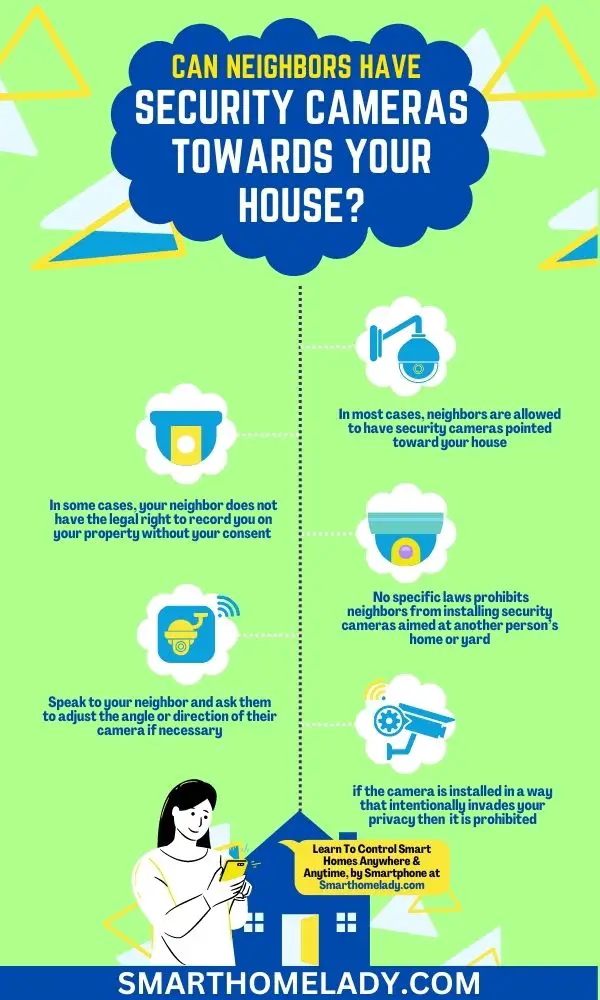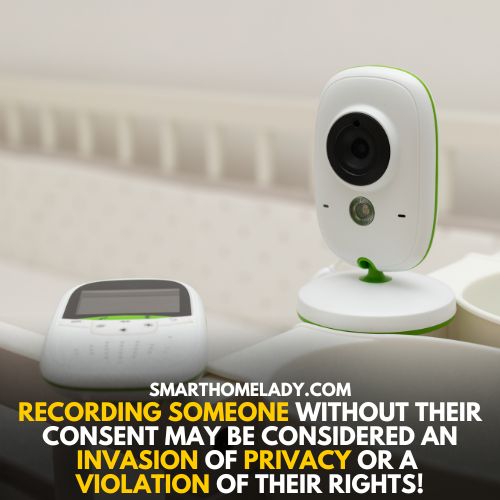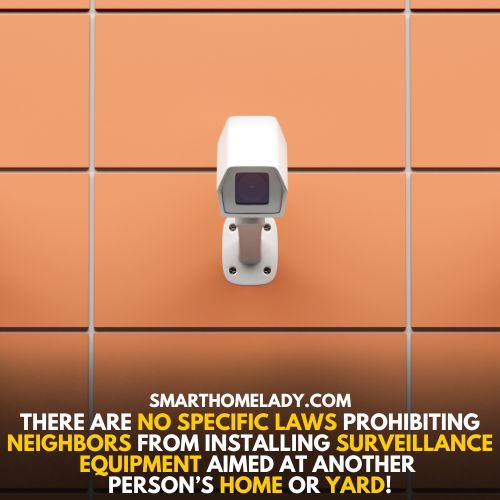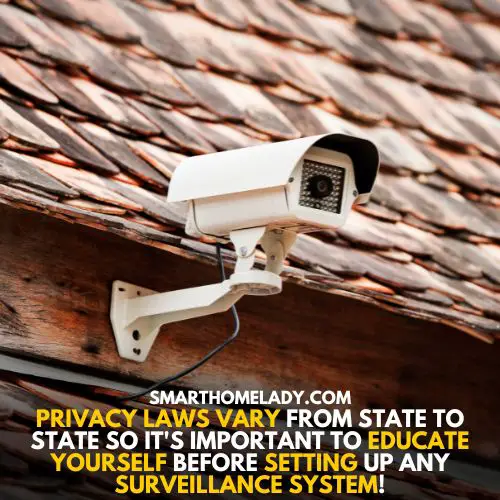Have you ever come home from a long day at work, only to notice that your neighbor has installed security cameras pointing directly toward your property?
It can be unsettling and bring up concerns about privacy. However, the question remains: Can neighbors have security cameras towards your house?
The answer is not straightforward as it depends on various factors such as the location of the camera and how it’s being used. With advancements in technology, many homeowners are now installing security cameras for added protection against crime.
But what happens when these cameras start infringing on others’ privacy rights?
In this article, we will dive into the legalities surrounding neighbors having security cameras facing your property and explore ways to address any potential issues that may arise.

Contents
- 1 Can Neighbors Have Security Cameras Towards Your House – 3 Scenarios
- 2 Can my neighbor record me on my property- Revealing The Truth
- 3 What can I do if my neighbor is recording me – 6 Things To Do
- 4 Understanding Privacy Laws And Rights
- 5 Assessing The Location And Placement Of Cameras
- 6 Addressing Privacy Issues With Your Neighbor
- 7 Seeking Legal Recourse If Necessary
- 8 How do I block my neighbor’s security cameras?
- 9 Is it legal to put cameras around your house?
- 10 Is it OK to have security cameras outside your house?
- 11 Conclusion
Can Neighbors Have Security Cameras Towards Your House – 3 Scenarios
As a homeowner, it’s important to understand the legalities surrounding your neighbor’s use of security cameras.
In most cases, neighbors are allowed to have security cameras pointed toward your house, as long as their cameras are capturing footage within their own property boundaries.
However, there are certain scenarios where this may not be permissible. These cameras may capture views of your property, but they cannot record you or anyone else without consent in areas where you have a reasonable expectation of privacy.
So, while your neighbor can monitor their surroundings, they must respect your privacy boundaries.
It’s crucial to ensure that their cameras are not positioned in a way that invades the inside of your home, where your privacy could potentially be violated.
Let’s explore the three situations in which neighbors are allowed to point security cameras toward your house, as well as the three scenarios where it may not be allowed.
3 Scenarios When Neighbours Can Have Security Cameras Towards Your House
First, let’s consider the situations in which neighbors are permitted to have security cameras facing your house.
Scenario 1
The first scenario is when the camera’s field of view is limited to their own property, it is typically within their rights to have it pointed toward your house.
This is because they have a reasonable expectation of privacy within their own property, and monitoring their surroundings is seen as a lawful way to ensure their safety and security.
As long as the camera is not infringing on your privacy by capturing footage inside your home, it generally falls within legal boundaries.
Scenario 2
Secondly, if your neighbor’s security camera is located on their property but captures a small portion like a yard or small view of your property, it may still be allowed.
In this scenario, it is important to consider whether the camera’s field of view extends significantly onto your property, invading your privacy.
If the camera’s primary focus remains on your neighbor’s property and the captured footage of your property is minimal, it is likely permissible.
However, if the camera is intentionally positioned to invade your privacy or constantly monitors your activities, it may be considered an intrusion.
Scenario 3
The third scenario where neighbors can have security cameras pointing toward your house is when they have obtained your consent.
If you have granted permission for your neighbor to install a camera that captures your property, they are legally allowed to do so. This could be a mutually beneficial arrangement, as it can provide an added layer of security for both parties involved.
However, it is important to ensure that any agreements or permissions are clearly communicated and documented to avoid any misunderstandings or conflicts in the future.
3 Scenarios When Neighbours Cannot Have Security Cameras Towards Your House
Now, let’s turn our attention to the situations in which neighbors are not allowed to have security cameras directed toward your house.
Scenario 1
Firstly, if the camera is installed in a way that intentionally invades your privacy, such as capturing footage inside your home or monitoring your private activities, it is likely to be prohibited.
Privacy laws generally protect individuals from being monitored without their consent within private spaces.
If you suspect that your neighbor’s camera is infringing on your privacy, it is advisable to consult local laws or seek legal advice to understand your rights.
Scenario 2
Secondly, if the camera is positioned in a way that significantly interferes with your reasonable enjoyment of your property, it may also not be permitted.
For instance, if the camera constantly shines bright lights into your home or emits loud noises that disturb your peace, it could be considered a nuisance.
In such cases, local ordinances or laws related to public nuisance may apply, and you may have the right to address the issue with your neighbor or involve local authorities.
Scenario 3
The second scenario where neighbors are not permitted to have security cameras facing your house is when they are using the camera for malicious purposes.
If you suspect that your neighbor is intentionally using the camera to harass, intimidate, or spy on you, it is important to take appropriate actions to protect yourself.
This could involve reaching out to local authorities or seeking legal advice to address the situation.
Relevant Reading
- Do You Need A Licence To Install Security Cameras – Facts
- Is It Illegal To Tamper With Security Cameras?
Can my neighbor record me on my property- Revealing The Truth
In most cases, your neighbor does not have the legal right to record you on your property without your consent. The laws regarding privacy and surveillance vary by jurisdiction, but generally, individuals have a reasonable expectation of privacy within the boundaries of their own property.
Recording someone without their consent may be considered an invasion of privacy or a violation of their rights, especially if the recordings are used for malicious or harmful purposes.

However, there may be exceptions to this rule, such as if your neighbor has a legitimate reason to record, such as for security purposes, or if they are a law enforcement officer acting within the scope of their duties.
It is advisable to consult the specific laws in your jurisdiction or seek legal advice if you believe your neighbor is recording you without your consent.
What can I do if my neighbor is recording me – 6 Things To Do
If you suspect that your neighbor is recording you and invading your privacy, there are a few steps you can take to address the situation.
1. Verify Your Suspicions
Firstly, it is important to verify your suspicions before taking any action. Look for signs such as unusual behavior or suspicious equipment around your property.
Begin by collecting evidence to support your claim. Document instances where you notice your neighbor recording you, noting the date, time, and location.
If possible, discreetly capture a video or take photographs as evidence. This documentation can be crucial to establish a pattern of invasion of privacy, should you need to involve legal authorities.
2. Communicate With Neighbors
Once you have gathered enough evidence to support your suspicions, it is time to communicate with your neighbors.
Address the issue directly by having a calm and respectful conversation with your neighbor. Explain your concerns and discomfort regarding their recording without your consent.
Your neighbor may not be aware of the impact their actions have on you, and this conversation can help resolve the matter amicably.
It is important to approach the conversation with an open mind, allowing space for a potential explanation or misunderstanding.
3. Enhance your privacy measures
While working towards resolving the issue, take proactive steps to enhance your privacy. Install window coverings, such as blinds or curtains, to prevent your neighbor from recording you inside your home.
Consider investing in security cameras around your property to deter any unwanted behavior or provide evidence if necessary.
Taking these measures can provide you with a sense of security while the situation is being addressed.
4. Mediation
If the situation escalates or you feel uncomfortable approaching your neighbor directly, consider seeking mediation.
Mediation involves a neutral third party who can facilitate a conversation between you and your neighbor, helping to resolve conflicts and find a mutually agreeable solution.
This approach can be particularly useful if you want to preserve a good relationship with your neighbor while addressing the issue at hand.
5. Review local laws
Familiarize yourself with local laws and regulations concerning privacy and recording. Different jurisdictions may have varying laws regarding recording in public spaces and private properties.
Understanding your legal rights will help you assess if your neighbor’s actions are unlawful and provide you with a stronger standpoint while discussing the issue with them or seeking legal assistance.
If your neighbor continues to record you despite your attempts to address the issue personally, it may be necessary to involve local authorities.
Contact your local law enforcement or file a complaint with your local neighborhood association, providing them with the evidence you have gathered.
Authorities can guide you further on the legal steps to take, ensuring your privacy rights are protected.
Relevant Readings
Can You Put A Security Camera On A Telephone Pole?
Understanding Privacy Laws And Rights
Many people consider the installation of neighbors’ security cameras pointing toward others’ houses an intrusive practice and an infringement on their right to privacy.
Although there are no specific laws prohibiting neighbors from installing surveillance equipment aimed at another person’s home or yard, it raises serious questions about ethical boundaries.
It can make one feel as though they’re constantly being watched without any consent or control over how the footage may be used.
The use of these cameras could potentially lead to disputes between neighbors as well as legal actions if the footage is used for malicious purposes.

As technology continues to advance, so does our need for better regulations around privacy rights.
It’s important for society to continue having discussions about what constitutes acceptable behavior when it comes to personal privacy before we all become unwitting actors in someone else’s reality show.
Disclaimer – I’m not a Lawyer and will not provide you any legal rights. All the information in this post is general.
Assessing The Location And Placement Of Cameras
In this day and age where privacy is becoming more of a concern, it’s important to assess the location and placement of your cameras.
Before deciding on where to install your security cameras, consider having neighborly communication with those living adjacent to you.
It’s courteous to let them know that you’ll be installing one and explain its purpose. This will prevent any misunderstandings or potential disputes in the future.
Additionally, if they do mention any concerns about their own privacy or the angle at which the camera will point towards their home, take note and adjust accordingly.
Camera etiquette goes beyond simply informing neighbors about your intentions.
Consider placing them in areas that only cover your property or common areas such as driveways and sidewalks. Avoid pointing them towards windows or other private spaces such as backyards or balconies.
Privacy laws vary from state to state so it’s important to educate yourself before setting up any surveillance system.

Addressing Privacy Issues With Your Neighbor
The use of security cameras by neighbors has become a common practice nowadays. While it may make you feel safer, some homeowners are concerned about their privacy being compromised.
If you’re in this situation, it’s essential to establish boundaries and communicate openly with your neighbor.
- Firstly, make sure that the camera is not pointing directly at your property or any area where people have a reasonable expectation of privacy.
- Speak to your neighbor and ask them to adjust the angle or direction of their camera if necessary. Explain how important your privacy is to you and listen to their perspective as well.
- Consider investing in curtains or blinds for added privacy inside your home. It can be uncomfortable knowing that someone might be watching every move you make even if it’s unintentional on their part.
- Lastly, communication strategies are vital when addressing concerns related to privacy issues with a neighbor. Try starting the conversation positively instead of accusing them of invasion of privacy right away.
You might suggest finding a compromise together that respects both parties’ needs while also maintaining each other’s rights to live safely without feeling observed all the time.
Seeking Legal Recourse If Necessary
If you feel that your neighbor’s security cameras are constantly pointing toward your property, it is natural to worry about your privacy.
While there are no specific laws prohibiting your neighbors from installing security cameras on their own property, they must ensure that the cameras do not invade your privacy or violate any local ordinances.
If you have tried talking to your neighbors and they refuse to cooperate, seeking legal action may be necessary.
However, before taking this step, consider using mediation services as a means of resolving the dispute amicably. Mediation involves sitting down with an impartial third party who can help both parties reach a mutually beneficial solution without resorting to costly litigation.
Frequently Asked Questions FAQs
How do I block my neighbor’s security cameras?
While it is understandable that you may have concerns about privacy, it is important to note that intentionally blocking or tampering with someone else’s security cameras is illegal and strongly discouraged.
Rather than resorting to such actions, it is recommended to address your concerns directly with your neighbor.
Engage in a respectful conversation to express your worries and explore potential solutions that respect both parties’ privacy needs.
It is always better to resolve conflicts through open communication rather than engaging in illegal activities.
Is it legal to put cameras around your house?
Yes, it is generally legal to install security cameras around your own house. However, it is crucial to familiarize yourself with local laws and regulations regarding surveillance systems to ensure compliance.
Laws may vary depending on your jurisdiction, but in many places, residents are allowed to install cameras on their own property as long as they do not invade the privacy of neighboring properties or public spaces.
It is advisable to position the cameras in a way that focuses solely on your property and its immediate surroundings, respecting the privacy of others.
Is it OK to have security cameras outside your house?
Yes, it is perfectly acceptable to have security cameras installed outside your house. In fact, many homeowners choose to install outdoor security cameras as a proactive measure to safeguard their property and enhance overall safety.
Outdoor cameras can deter potential intruders, capture evidence in case of a crime, and provide peace of mind.
However, it is important to use these cameras responsibly, ensuring they do not invade the privacy of others.
Aim the cameras towards your own property, avoiding areas where your neighbors’ privacy may be compromised, such as their windows or backyards.
Conclusion
In conclusion, it is important to understand the laws and rights surrounding security cameras.
While your neighbor may have the right to install security cameras on their property, they must also be mindful of respecting your privacy. When assessing the location and placement of cameras, consider if they are pointing towards your property or windows.
If you feel uncomfortable with their placement, address the issue with your neighbor in a calm and respectful manner. Communication can go a long way in finding a solution that works for both parties.
Finally, if all attempts at resolving the issue fail, seeking legal recourse may be necessary.
Let’s strive for peaceful coexistence within our communities by being understanding neighbors who value mutual respect and harmony.
Sources
- Can My Neighbor Legally Point a Security Camera at My Property? By Brian Farkas, Attorney (Source Link)
- Concerned About Privacy? Here’s What To Do If Your Neighbor’s Security Camera is Pointed At Your House (Source Link)
- Can Security Video Recordings Violate Your Neighbor’s Right to Privacy? By Goodman Law (Source Law)


